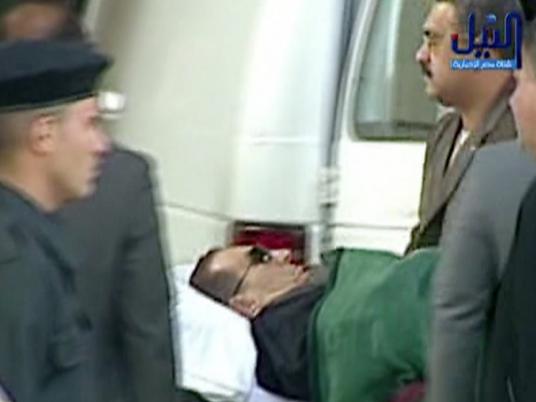
Cairo Criminal Court will set the date for issuing a ruling in the trial of former President Hosni Mubarak, who is charged with killing protesters during the 18-day uprising last year and corruption, on Wednesday.
On Thursday, the court continued to hear the defense's case. Ahmed Refaat, the head judge in the trial, said the court will accept the defense's final written comments during the hearing's final session on Wednesday, 22 February. The court will accept final written arguments from the prosecution and plaintiffs' lawyers on Monday, 20 February. Refaat said that the court will not accept oral arguments.
Former Interior Minister Habib al-Adly and six top security officers are standing trial alongside Mubarak on charges of ordering security forces to kill protesters during the revolution. The former president, his sons and businessman Hussein Salem also face corruption charges.
The court heard the legal defense of the last suspect in the case, former 6th of October City security chief Major General Omar al-Faramawy. Faramawy's lawyers demanded his client be cleared of accusations that he and Giza Security Director Osama al-Marasi had ordered their police to Tahrir Square to support security forces, which were in charge of dealing with protesters there between 25 and 28 January 2011.
The prosecution had argued that Faramawy's decision caused a security vacuum, which led to chaos and huge damages to public and private properties.
However, Faramawy's lawyer said that he never ordered the withdrawal of troops, but rather provided enough to preserve security in 6th of October City better than in other governorates. The city has since been incorporated into Giza Governorate.
The attorney added that Faramawy secured protests from the involvement of saboteurs and that if he had done anything different, he would have been accused of killing protesters like the rest of the security officials charged.
Faramawy was not responsible for any of the crimes that took place after 4 pm on 28 January, as the armed forces had taken charge of security by that time, his lawyer continued. The prosecution has not provided any evidence of damages to public and private institutions resulting from Faramawy's actions, his lawyer said, adding that some infiltrators among protesters were armed and that a massacre could have taken place if Faramawy's forces had shot at them with live ammunition.
Translated from Al-Masry Al-Youm




